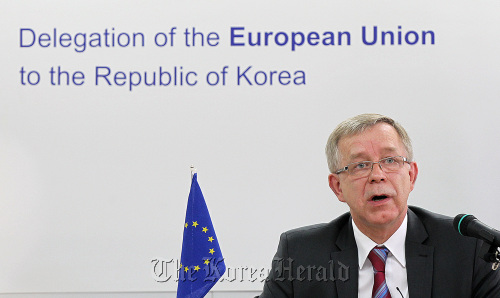 |
EU Ambassador Tomasz Kozlowski speaks during a news conference on Thursday. (Yonhap News) |
On July 1 a historic Free Trade Agreement will come into effect between two important actors on the world trade scene: the EU and Korea. The EU-Korea FTA is a landmark agreement. It is the most ambitious ever FTA negotiated by the EU with a partner outside Europe and the first FTA with a country in Asia.
The EU is already Korea’s second-largest trade partner, with one out of every five products exported by Korea bought by customers in the EU. On the other side, Korea consistently ranks as one of the EU’s top 10 trade partners.
The FTA marks the beginning of an economic alliance. It will not only boost trade and economic growth, but send a signal to the world of our commitment to free trade.
Much has been written about the expected impact of this agreement on trade, growth and jobs.
One study, for example, estimates that the FTA will create new trade in goods and services for both the EU and Korea worth more than 30 billion euros ($43 billion) a year. Another study, taking a more comprehensive approach, concluded that the FTA will more than double the bilateral EU- Korea trade in the next 20 years compared to a business as usual scenario.
Such macroeconomic effects are notoriously difficult to estimate, even for our best experts and academics. However, for those of us involved in the day-to-day business of trade policy, it is not difficult to see how the FTA will make a difference.
Throughout the economic ups and downs of the last decade, EU-Korea trade has experienced an average growth of 10 percent per year on average, much faster than the economies on both sides. This means that much of the low-hanging fruit of bilateral trade has already been exploited. If we want to keep the momentum and look forward to another decade of accelerating economic exchanges, we need to make the road as open and smooth as possible for our companies to trade and invest.
The first contribution of the FTA will be a tariff reduction which is impressive in speed and scope: almost 100 percent of EU and Korean duties on both industrial and agricultural products will be eliminated within short transitional periods (98.7 percent within five years). In concrete terms, this amounts to yearly savings of more than 2 billion euro in tariffs. This is no negligible stimulus package for our exporters, at a time when job creation and competitiveness are among our top priorities.
A vital element of the agreement is the way that it goes beyond the border to tackle non-tariff barriers to trade. These non-tariff barriers are mainly a by-product of increasingly complex regulation in our societies, justified by consumer, environment and social protection. Fortunately, the EU and Korea have similar objectives in these fields. The FTA gives us a number of tools to promote and consolidate our convergence in the regulatory field, with full respect for each side’s legitimate policy objectives and sovereignty. Examples are the automotive, electronics and pharmaceutical sectors.
Trade in services, often less visible than trade in physical goods, is no less important. Already services account for about three quarters of GDP in the world’s advanced economies. Exchanges of services across national borders are growing faster than those of traditional goods, thanks mainly to rapid technological change in the telecom and information technology fields, and mainly the Internet.
The EU is the world’s greatest exporter of services, a process Korea is also following as its services companies modernize and reach into global markets. Modernization and increased competition in business services, in particular, has a beneficial impact on the competitiveness of the economy as a whole. The EU-Korea FTA consolidates the liberalization already achieved in services industries, and expands market access in a few, but significant sectors. Examples include: business services, environmental services and construction.
The EU and Korean economies complement each other. While some studies suggest that the Korean car and electronic sectors will benefit from access to the EU market of 500 million consumers, others point to likely increased sales in Korea for European manufacturers of industrial machines and luxury products. It is without a doubt that overall this is a win-win agreement.
Last but not least, it should not be forgotten that the EU-Korea relationship goes beyond trade. The upgraded Framework Agreement and the declaration of a Strategic Partnership constitute the other pillars of this now comprehensive relationship. The upgraded Framework Agreement will be the basis to expand cooperation in science and technology, climate action, education, law enforcement and development policy. Notably, it will enhance political dialogue and cooperation between the EU and Korea. The Declaration of Strategic Partnership in 2010 was a reflection not only of common goals and global challenges but also shared values.
The Republic of Korea, as a bastion of democracy in Asia and an economic powerhouse is a natural partner for the European Union in addressing new global challenges and opportunities. We are now at the beginning of a new era in our relationship. The FTA provides the framework for growth. It is time to seize the new opportunities.
By Tomasz Kozlowski, Ambassador, Head of the European Union Delegation








